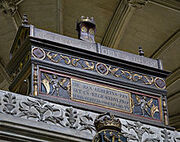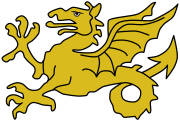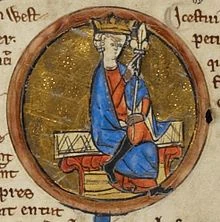- 802-839: King of Wessex
- 825-839: King of Kent
- Ecgbryht cyning of Westseaxum (Old English)
Egbert of Wessex was born circa 769 to Ealhmund of Kent (c740-784) and died 839 of unspecified causes.
Biography
Ecgbryht (also spelled Egbert, Ecgberht, Ecgbert or Ecgbriht) was King of Wessex from 802 until his death in 839. His father was Ealhmund of Kent. In the 780s Egbert was forced into exile by Offa of Mercia and Beorhtric of Wessex, but on Beorhtric's death in 802 Egbert returned and took the throne.
House of Wessex
He was of the royal English dynasty called House of Wessex, a family originating in the southwest corner of England and gradually increased in power and prestiege. The House became rulers of all the country with the reign of Alfred the Great in 871 and lasting until Edmund Ironside in 1016. This period of the English monarchy is known as the Saxon period.
Reign of Egbert
Little is known of the first 20 years of Egbert's reign, but it is thought that he was able to maintain the independence of Wessex against the kingdom of Mercia, which at that time dominated the other southern English kingdoms. In 825 Egbert defeated Beornwulf of Mercia, ended Mercia's supremacy at the Battle of Ellandun, and proceeded to take control of the Mercian dependencies in southeastern England. In 829 Egbert defeated Wiglaf of Mercia and drove him out of his kingdom, temporarily ruling Mercia directly. Later that year Egbert received the submission of the Northumbrian king at Dore. The Anglo-Saxon Chronicle subsequently described Egbert as a bretwalda, or "Ruler of Britain".
Egbert was unable to maintain this dominant position, and within a year Wiglaf regained the throne of Mercia. However, Wessex did retain control of Kent, Sussex, and Surrey; these territories were given to Egbert's son Æthelwulf to rule as a subking under Egbert. When Egbert died in 839, Æthelwulf succeeded him; the southeastern kingdoms were finally absorbed into the kingdom of Wessex after Æthelwulf's death in 858.
825 Battle of Ellendun
It was in 825 that one of the most important battles in Anglo-Saxon history took place, when Egbert defeated Beornwulf of Mercia at Ellendun—now Wroughton, near Swindon. This battle marked the end of the Mercian domination of southern England.
In 829 Egbert invaded Mercia and drove Wiglaf, the king of Mercia, into exile. This victory gave Egbert control of the London mint, and he issued coins as King of Mercia. It was after this victory that the West Saxon scribe described him as a bretwalda, meaning "wide-ruler" or "Britain-ruler".
Burial at Winchester

16th-century mortuary chest, one in a series set up by Bishop Foxe in Winchester Cathedral, which purports to contain Egbert's bones.
At a council at Kingston upon Thames in 838, Egbert and Æthelwulf granted land to the sees of Winchester and Canterbury in return for the promise of support the clergy for Æthelwulf's claim to the throne.
Egbert was buried in Winchester, as were his son, Æthelwulf, his grandson, Alfred the Great, and his great-grandson, Edward the Elder. During the ninth century, Winchester began to show signs of urbanisation, and it is likely that the sequence of burials indicates that Winchester was held in high regard by the West Saxon royal line
Ancestry Dispute
Historians do not agree on Ecgberht's ancestry.
Genealogy in Anglo-Saxon Chronicle
The earliest version of the Anglo-Saxon Chronicle, the Parker Chronicle, begins with a genealogical preface tracing the ancestry of Ecgberht's son Æthelwulf back through Ecgberht, Ealhmund (thought to be king Ealhmund of Kent), and the otherwise unknown Eafa and Eoppa to Ingild, brother of King Ine of Wessex, who abdicated the throne in 726. It continues back to Cerdic, founder of the House of Wessex.[1] Ecgberht's descent from Ingild was accepted by Frank Stenton, but not the earlier genealogy back to Cerdic.[2]
Heather Edwards in her Oxford Dictionary of National Biography article on Ecgberht argues that he was of Kentish origin, and that the West Saxon descent may have been manufactured during his reign to give him legitimacy,[3] whereas Rory Naismith considered a Kentish origin unlikely, and that it is more probable that "Ecgberht was born of good West Saxon royal stock".[4]
Marriage & Family
Ecgberht's wife's name is unknown. A fifteenth-century chronicle now held by Oxford University names her as Redburga, supposedly a relative of Charlemagne whom he married when he was banished to Francia, but this is dismissed by academic historians in view of its late date.[5]
- Æthelwulf of Wessex (c795-858) - Successor as King of Wessex - only known child.
Other Relationships
It's worth noting that Ecgberht also had at least one illegitimate son, named Wihtred, who is mentioned in the Anglo-Saxon Chronicle. However, little is known about Wihtred and he did not play a significant role in the history of Anglo-Saxon England.
Children
| Name | Birth | Death | Joined with |
| Æthelwulf of Wessex (c795-858) | 795 Imperial Frankish Court, Aachen, France | 13 January 858 Steyning, Sussex | Osburga (-bef856) Judith (844-870) |
| Name | Birth | Death | Joined with |
| Wihtred of Wessex (c800-) | |||
Siblings
| Name | Birth | Death | Joined with |
| Egbert of Wessex (c769-839) | 769 | 839 | |
| Æthelburh of Wilton (c770-) | |||
He is reputed to have had a half-sister Alburga, later to be recognised as a saint for her founding of Wilton Abbey. She was married to Wulfstan, ealdorman of Wiltshire, and on his death in 802 she became a nun, Abbess of Wilton Abbey.[6]
See Also
Bibliography
Primary sources
- Swanton, Michael (1996). The Anglo-Saxon Chronicle. New York: Routledge. ISBN 0-415-92129-5.
- Egbert's charters at Anglo-Saxons.net
Secondary sources
- Abels, Richard (2005). Alfred the Great: War, Kingship and Culture in Anglo-Saxon England. Longman. ISBN 0-582-04047-7.
- Ashley, Mike (1998). The Mammoth Book of British Kings and Queens. London: Robinson. ISBN 1-84119-096-9.
- Campbell, James; John, Eric; Wormald, Patrick (1991). The Anglo-Saxons. London: Penguin Books. ISBN 0-14-014395-5.
- Edwards, Heather (2004) "Ecgberht", Oxford Dictionary of National Biography
- Fletcher, Richard (1989). Who's Who in Roman Britain and Anglo-Saxon England. Shepheard-Walwyn. ISBN 0-85683-089-5.
- Higham, N. J.; Hill, D. H. (2001). Edward the Elder. Routledge. ISBN 978-0-415-21497-1.
- Hunt, William (1975). "Egbert, king of the West-Saxons". Dictionary of National Biography. 1 (Compact ed.). Oxford University Press. ISBN 0-19-865102-3.
- Hunter Blair, Peter (1966). Roman Britain and Early England: 55 B.C. – A.D. 871. W.W. Norton & Company. ISBN 0-393-00361-2.
- Kirby, D. P. (1992). The Earliest English Kings. London: Routledge. ISBN 0-415-09086-5.
- Naismith, Rory (2011). "The Origins of the Line of Egbert, King of the West Saxons, 802 – 839". English Historical Review CXXVI: 1–16. DOI:10.1093/ehr/ceq377.
- Nelson, Janet L. (2004). "Æthelwulf (d. 858)". Oxford Dictionary of National Biography. Oxford University Press. doi:10.1093/ref:odnb/8921. http://www.oxforddnb.com/view/article/8921?docPos=1. Retrieved 14 April 2012. (subscription or UK public library membership required)
- Payton, Philip (2004). Cornwall: A History. Cornwall Editions. ISBN 1-904880-00-2.
- Stenton, Frank M. (1971). Anglo-Saxon England. Oxford: Clarendon Press. ISBN 0-19-821716-1.
External Links
- wikipedia:en:Ecgberht, King of Wessex
- Ecgberht, King of Wessex at thePeerage
- Ecgberht, King of Wessex - Geni.com
- Ecgberht, King of Wessex at Find A Grave
- Anglo-Saxon and Danish Kings of England - Foundation for Medieval Genealogy
- Ecgberht 10 at Prosopography of Anglo-Saxon England
Ancestry Trees
- Alfred the Great Family Ancestry
- House of Wessex
- Anglo-Saxon Chronicle which gives a genealogy for Æthelwulf of Wessex (c795-858).
Contemporary Sources
Best Contemporary sources for Egbert of Wessex, are:
- The Anglo-Saxon Chronicle: This is the primary source for the history of Anglo-Saxon England, and covers the period from the arrival of the Saxons in Britain in the 5th century up to the 12th century. The Chronicle contains several entries relating to Ecgberht and his reign, and is the most important contemporary source for his life. This includes a genealogy for Æthelwulf of Wessex (c795-858).
- Asser's Life of King Alfred: Asser was a Welsh monk who served as a bishop in Wessex during the reign of King Alfred the Great, who was Ecgberht's grandson. Asser wrote a biography of Alfred, which includes information about Ecgberht and his reign.
- The Vita Offae Primi: This is a hagiography of St. Oda, the first bishop of Sherborne, who was appointed by Ecgberht. The Vita includes information about Ecgberht's reign and his relationship with the church.
- The Anglo-Saxon Coins of Ecgberht: Ecgberht was known for his minting of coins, which provide a valuable source of information about his reign and the political and economic conditions of the time.
Original Citations
839 Anglo-Saxon Chronicle
The Anglo-Saxon Chronicle is one of the most important contemporary sources for the history of Anglo-Saxon England, and provides valuable insights into the political and military events of the time.
"Her forðferde Ecgberht cyning on West Seaxum, and his sunu Æþelwulf feng to rice. And se ylca Æþelwulf cyning ricsode xxxvii wintra. And his sunu Æþelbald feng to West Seaxna rice æfter him."
Translation: "In this year [839 AD], King Ecgberht died in Wessex, and his son Æthelwulf succeeded to the throne. And the same Æthelwulf reigned for 37 years. And his son Æthelbald succeeded to the throne of the West Saxons after him."
This citation is significant because it provides information about the death of Ecgberht and the succession of his son Æthelwulf to the throne, as well as the subsequent succession of Æthelwulf's son Æthelbald.
836 Anglo-Saxon Chronicle
This citation (for 836 AD) is significant because it describes a military campaign undertaken by Ecgberht against the kingdom of Northumbria, as well as the subsequent defeat of Ecgberht by a coalition of Mercians and West Saxons. The citation also mentions the construction of a significant religious building, the minster at Wareham, which provides insight into the religious and cultural practices of the time.
"And Ecgberht cyning hergode þa rice of Dyrham on þa healfe, and Burgred Myrcna cyning and his Westseaxna freond mid fote gefeohtes gefliemdon. And þy ilcan geare wæs þæt mycel mynster æt Werham getimbrod."
Translation: "And King Ecgberht harried the kingdom of the Northumbrians on the eastern side, and King Burgred of the Mercians and his West Saxon allies put him to flight in a battle on foot. And in the same year, the great minster at Wareham was built."
Royal Succession Table
| Regnal titles | ||
|---|---|---|
| Preceded by Beorhtric |
King of Wessex 802–839 |
Succeeded by Æthelwulf |
| Preceded by Baldred |
King of Kent 825–839 | |
References
- ^ Garmonsway, G. N. ed., The Anglo-Saxon Chronicle, London, J. M. Dent & Sons, Ltd., pp. xxxii, 2, 4
- ^ Stenton, Anglo-Saxon England, pp. 65–66
- ^ Edwards, Ecgberht
- ^ Naismith, p. 16
- ^ The chronicle (Hardy, Vol III, No. 326) describes Ecgberht's wife as "Redburga regis Francorum sororia" (sister or sister-in-law of the Frankish Emperor). Some nineteenth-century historians cited the manuscript to identify Redburga as Ecgberht's wife, such W. G. Searle in his 1897 Onomasticon Anglo-Saxonicum and (as Rædburh) in his 1899 Anglo-Saxon Bishops, Kings and Nobles. Other historians of that time were sceptical, such as William Hunt, who did not mention Redburga in his article about Ecgberht in the original Dictionary of National Biography in 1889 (Hunt, "Egbert", pp. 619–620). In the twentieth century, popular genealogists and historians have followed Searle in naming Redburga as Ecgberht's wife, but academic historians ignore her when discussing Ecgberht, and Janet Nelson's 2004 article on his son Æthelwulf in the Oxford Dictionary of National Biography states that his mother's name is unknown.
- ^ Farmer, D. H.: The Oxford Dictionary of Saints, p. 10
Footnotes (including sources)
| ‡ General |
|
| Ω Birth |
|
|

